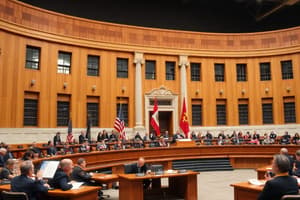Podcast
Questions and Answers
What are the core values of the Council of Europe?
What are the core values of the Council of Europe?
Democracy, human rights, and the rule of law.
How does international law support the protection of rights?
How does international law support the protection of rights?
It provides treaties and agreements that establish frameworks to protect rights across borders.
What role does the European Court of Human Rights play in enforcing international law?
What role does the European Court of Human Rights play in enforcing international law?
It ensures that states comply with their obligations under international law.
What is the significance of the Charter of Fundamental Rights of the European Union?
What is the significance of the Charter of Fundamental Rights of the European Union?
In what way does EU law act as a bridge between international law and national law?
In what way does EU law act as a bridge between international law and national law?
What is the function of the Court of Justice of the European Union (CJEU)?
What is the function of the Court of Justice of the European Union (CJEU)?
Why might individuals bring cases to international courts?
Why might individuals bring cases to international courts?
How is law described in relation to its layers and complexity?
How is law described in relation to its layers and complexity?
What does the Principle of Legality ensure regarding government actions?
What does the Principle of Legality ensure regarding government actions?
How does the concept of equality before the law contribute to fairness in society?
How does the concept of equality before the law contribute to fairness in society?
What is meant by the absence of arbitrariness in public authority decisions?
What is meant by the absence of arbitrariness in public authority decisions?
Why is the separation of powers important in a constitutional framework?
Why is the separation of powers important in a constitutional framework?
What role does the independence of the judiciary play in upholding the rule of law?
What role does the independence of the judiciary play in upholding the rule of law?
How must governments respect fundamental rights according to the rule of law?
How must governments respect fundamental rights according to the rule of law?
What does the binding nature of laws imply for citizens and the government?
What does the binding nature of laws imply for citizens and the government?
What is the purpose of judicial review in a constitutional context?
What is the purpose of judicial review in a constitutional context?
What constitutes national law and what are its main components?
What constitutes national law and what are its main components?
Why is the definition of a constitution as ‘the national law of a state’ considered imprecise?
Why is the definition of a constitution as ‘the national law of a state’ considered imprecise?
What role do national courts, particularly Supreme Courts, play in the enforcement of national law?
What role do national courts, particularly Supreme Courts, play in the enforcement of national law?
Identify one of the basic questions of constitutional law concerning the allocation of power.
Identify one of the basic questions of constitutional law concerning the allocation of power.
What is constitutionalism and why is it important in the context of democratic governance?
What is constitutionalism and why is it important in the context of democratic governance?
Explain the significance of having limits on the exercise of power in constitutional law.
Explain the significance of having limits on the exercise of power in constitutional law.
What distinguishes institutional law as a branch of constitutional law?
What distinguishes institutional law as a branch of constitutional law?
How do national remedies relate to individuals' rights protection under national law?
How do national remedies relate to individuals' rights protection under national law?
What distinguishes permanent residents from full citizens?
What distinguishes permanent residents from full citizens?
What are the conditions under which holders of student or work visas can maintain their status?
What are the conditions under which holders of student or work visas can maintain their status?
What protections do migrants with refugee status receive under international law?
What protections do migrants with refugee status receive under international law?
What is the main limitation of refugees regarding permanent residency?
What is the main limitation of refugees regarding permanent residency?
What does a tourist visa typically prohibit?
What does a tourist visa typically prohibit?
How is 'toleration status' defined, and what are its implications for migrants?
How is 'toleration status' defined, and what are its implications for migrants?
What characterizes individuals with no legal status or irregular status in a country?
What characterizes individuals with no legal status or irregular status in a country?
How does the category of temporary migrants differ from that of permanent residents?
How does the category of temporary migrants differ from that of permanent residents?
What are the three classes of migrants identified in the migration analysis?
What are the three classes of migrants identified in the migration analysis?
Describe the status of Denizens in relation to citizens.
Describe the status of Denizens in relation to citizens.
What is one key mechanism that states use to control migrants after their admission?
What is one key mechanism that states use to control migrants after their admission?
How do Margizens differ from Citizens in terms of legal status?
How do Margizens differ from Citizens in terms of legal status?
What types of requirements must migrants often meet to access more secure statuses?
What types of requirements must migrants often meet to access more secure statuses?
Explain the significance of states’ regulatory control over migrant inclusion and exclusion.
Explain the significance of states’ regulatory control over migrant inclusion and exclusion.
Why might a state create numerous statuses to differentiate migrants' rights?
Why might a state create numerous statuses to differentiate migrants' rights?
What role do citizenship tests and language tests play in the migration control mechanisms?
What role do citizenship tests and language tests play in the migration control mechanisms?
What is Lydia Morris' primary concern in her critique regarding migration?
What is Lydia Morris' primary concern in her critique regarding migration?
What are two outcomes of migration law identified by Lydia Morris?
What are two outcomes of migration law identified by Lydia Morris?
How does the concept of European citizenship impact migration?
How does the concept of European citizenship impact migration?
What societal inequality does Morris highlight in relation to migrants' legal status?
What societal inequality does Morris highlight in relation to migrants' legal status?
In what way does migration law enforce a hierarchy among migrant categories?
In what way does migration law enforce a hierarchy among migrant categories?
What do the categories defined by migration law imply for the freedom of migrants?
What do the categories defined by migration law imply for the freedom of migrants?
How does the interplay between national closure and international rights affect migrants?
How does the interplay between national closure and international rights affect migrants?
What implications do legal distinctions between migrant categories have on their daily lives?
What implications do legal distinctions between migrant categories have on their daily lives?
Flashcards
National Law
National Law
The system of laws within a country, including its constitution, statutes, and court system.
Constitutional Fundamental Rights
Constitutional Fundamental Rights
Rights guaranteed by a country's constitution, like freedom of speech or equality.
Supreme Court
Supreme Court
The highest court in a country, responsible for upholding the constitution.
Constitutionalism
Constitutionalism
Signup and view all the flashcards
Rule of Law
Rule of Law
Signup and view all the flashcards
Institutional Law
Institutional Law
Signup and view all the flashcards
Individual Rights Law
Individual Rights Law
Signup and view all the flashcards
Constitutional Review
Constitutional Review
Signup and view all the flashcards
EU Law
EU Law
Signup and view all the flashcards
International Law
International Law
Signup and view all the flashcards
Charter of Fundamental Rights of the EU
Charter of Fundamental Rights of the EU
Signup and view all the flashcards
European Court of Human Rights (ECtHR)
European Court of Human Rights (ECtHR)
Signup and view all the flashcards
Court of Justice of the European Union (CJEU)
Court of Justice of the European Union (CJEU)
Signup and view all the flashcards
European Convention on Human Rights (ECHR)
European Convention on Human Rights (ECHR)
Signup and view all the flashcards
Multilayered System of Law
Multilayered System of Law
Signup and view all the flashcards
Democracy
Democracy
Signup and view all the flashcards
Respect for Legality
Respect for Legality
Signup and view all the flashcards
Equality Before the Law
Equality Before the Law
Signup and view all the flashcards
Absence of Arbitrariness
Absence of Arbitrariness
Signup and view all the flashcards
Separation of Powers
Separation of Powers
Signup and view all the flashcards
Independence of the Judiciary
Independence of the Judiciary
Signup and view all the flashcards
Respect for Fundamental Rights
Respect for Fundamental Rights
Signup and view all the flashcards
Binding Nature of Laws
Binding Nature of Laws
Signup and view all the flashcards
Judicial Review
Judicial Review
Signup and view all the flashcards
Permanent Residents
Permanent Residents
Signup and view all the flashcards
Temporary and Limited Rights Categories
Temporary and Limited Rights Categories
Signup and view all the flashcards
International Protection / Refugee Status
International Protection / Refugee Status
Signup and view all the flashcards
Toleration Status ('Duldung')
Toleration Status ('Duldung')
Signup and view all the flashcards
No Status / Irregular / Sans-Papiers
No Status / Irregular / Sans-Papiers
Signup and view all the flashcards
Tourist Visa / Family Visit Visa
Tourist Visa / Family Visit Visa
Signup and view all the flashcards
Migrant Status Categories
Migrant Status Categories
Signup and view all the flashcards
Rights of Migrants
Rights of Migrants
Signup and view all the flashcards
Migration Control
Migration Control
Signup and view all the flashcards
Stratification of Migrants
Stratification of Migrants
Signup and view all the flashcards
Citizens
Citizens
Signup and view all the flashcards
Denizens
Denizens
Signup and view all the flashcards
Margizens
Margizens
Signup and view all the flashcards
Mechanisms of Migration Control Within the State
Mechanisms of Migration Control Within the State
Signup and view all the flashcards
Rules of Transition
Rules of Transition
Signup and view all the flashcards
Conditions for Progression
Conditions for Progression
Signup and view all the flashcards
Shifting Focus in Migration Control
Shifting Focus in Migration Control
Signup and view all the flashcards
Creating Categories of Migrants
Creating Categories of Migrants
Signup and view all the flashcards
Hierarchies Between Migrant Categories
Hierarchies Between Migrant Categories
Signup and view all the flashcards
National & International Interplay
National & International Interplay
Signup and view all the flashcards
Migrant Experience: Exclusion & Inclusion
Migrant Experience: Exclusion & Inclusion
Signup and view all the flashcards
Legal Status: Security & Pressure
Legal Status: Security & Pressure
Signup and view all the flashcards
Legal Systems and Inequality
Legal Systems and Inequality
Signup and view all the flashcards
Consequences of Legal Hierarchies
Consequences of Legal Hierarchies
Signup and view all the flashcards
Study Notes
Week 2: Controlling Migration Within the State
- Democracy and the rule of law are core values of the Council of Europe, as stated in the European Convention on Human Rights (ECHR).
- The ECHR is a document created by the Council of Europe, comprising 46 countries.
- The court that ensures the rights stipulated in the ECHR is located in Strasbourg.
Law as a Multilayered System
- Law is a multilayered system, interconnected in complex ways, including international, EU, and national law.
- The diagram illustrates the multilayered structure of law, with examples like the protection of rights, showing the relationships between these levels.
1. International Law
- Definition: International law consists of treaties, agreements, and customary principles that transcend national borders.
- Examples: Human rights treaties (e.g., the European Convention on Human Rights (ECHR)).
- Enforcement Mechanisms: International courts or treaty bodies (e.g., the European Court of Human Rights (ECtHR)) that ensure states comply with their international law obligations.
2. EU Law
- Definition: The legal framework specific to EU member states, encompassing treaties, regulations, and directives.
- Example: The Charter of Fundamental Rights of the European Union consolidates these rights.
- Enforcement Mechanism: The Court of Justice of the European Union (CJEU) interprets and applies EU law, ensuring uniformity across member states.
- Relevance: Bridges between international and national law, ensuring member states uphold fundamental rights.
3. National Law
- Definition: The domestic legal framework of individual countries, including constitutions, statutes, and judicial systems.
- Example: Constitutional fundamental rights (e.g., freedom of speech, equality) enshrined in national constitutions.
- Enforcement Mechanism: National courts (e.g., Supreme Courts or Constitutional Courts) ensure domestic laws comply with the constitution.
- Relevance: The first point of recourse for individuals protecting their rights, escalating to EU or international bodies if national remedies are inadequate or violate international obligations.
Relevance to Rights Protection
- International treaties provide universal or regional frameworks to protect rights that may not be adequate at the national level.
- Individuals can bring cases to international courts if national remedies fail.
What is a Constitution?
- A constitution is often considered the national law of a state, but it doesn't incorporate all laws.
Narrow/Formal and Broad/Substantive Meaning of Constitution
- Narrow/Formal: Central written document setting basic rules for state governance.
- Broad/Substantive: The entire body of fundamental rules governing a state, comprising laws:
- Attributing power to public authorities.
- Regulating relations between public authorities.
- Regulating relations between public authorities and individuals.
Basic Questions of Constitutional Law
- Does institution X have power Y (only if explicitly allocated by the constitution)?
- Does the exercise of power respect constitutional limits and fundamental rights?
- Who has the power to supervise power exercise?
Constitutionalism and the Rule of Law
- Constitutionalism defines public power's governance and constraint by a constitution and the rule of law.
- There is no absolute power, and even monarchs are bound by constitutions.
Two Basic Branches of Constitutional Law
- Institutional law: Governs power and task distribution.
- Fundamental rights: Protects citizens from the state.
Substantive versus Procedural
- Procedural: Focuses on the process of lawmaking and implementation (doesn't care about law's content).
- Substantive: Cares about the content of law. Cannot discriminate based on factors like socioeconomic status.
Rule of Law
- Under the rule of law, every citizen (including lawmakers, officials, and judges) is subject to the law.
- It contrasts with the idea of a ruler above the law (e.g., in tyrannical or oligarchic societies).
- Thin/Formalist: No judgment on law's justice, only procedure.
- Thick/Substantive: Includes ideas of justice and rights.
Rule of Law Pre-supposes (Heringa)
- Respect for legality;
- Guarantees of equality before the law;
- Absence of arbitrariness;
- Separation of powers;
- Independence of judiciary;
- Respect for fundamental rights.
Core Elements of the Rule of Law
- Respect for Legality: Government actions follow existing laws, including for the government itself, and not retroactive laws
- Guarantees of Equality Before the Law: Laws are applied impartially to all individuals.
- Absence of Arbitrariness: Decisions must be based on clear laws, not arbitrary discretion or favouritism/bias
- Separation of Powers: Distinct legislative, executive, and judicial functions ensure checks and balances, to prevent abuse, and
- Independence of Judiciary: Courts operate free from external influence, unbiased interpretation and application of law
Studying That Suits You
Use AI to generate personalized quizzes and flashcards to suit your learning preferences.





